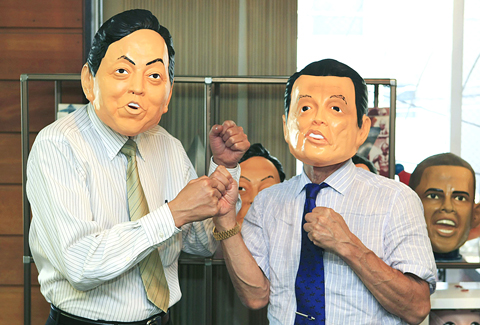Japan’s opposition has increased its lead over Japanese Prime Minister Taro Aso’s long-ruling party, opinion polls showed yesterday, suggesting it was on course for a landslide win in this weekend’s election.
The Democratic Party of Japan (DPJ), seeking to end half a century of almost unbroken rule by the Liberal Democratic Party (LDP), could win more than 300 seats in the 480-seat lower house in tomorrow’s election, the Yomiuri Shimbun said.
The daily, which questioned more than 85,000 voters in a telephone poll from Tuesday to Thursday, said there was a “strong likelihood of a change of government,” with the LDP unable to stop the “DPJ’s overwhelming momentum.”

PHOTO: REUTERS
The advance of the center-left DPJ, led by Yukio Hatoyama, reflects voters’ dissatisfaction with the LDP and the leadership of gaffe-prone Aso amid tough economic times.
New data yesterday showed that employment had risen to a post-war high of 5.7 percent in July, in the latest set of bleak numbers for the government.
Reflecting high public interest in the landmark poll, more than 3 million voters had cast early ballots by the end of Sunday, a week before the poll, the latest figures by the internal affairs ministry showed.
The number was up 52 percent from the same period in the last general election in 2005, in which the ruling party scored a historic win under popular former Japanese prime minister Junichiro Koizumi with high voter turnout of 67.5 percent.
Other polls yesterday also showed the DPJ strongly ahead.
Polling by Kyodo news agency on Wednesday and Thursday found that 35.9 percent of respondents would give their votes to the DPJ in the proportional representation part of the vote, compared with 17.9 percent for the LDP.
In the vote for individual candidates, 36 percent said they would vote for Democratic Party candidates and 22.6 percent for Liberal Democrat candidates.
Also See: Japan’s jobless rate hits record ahead of election

Four people jailed in the landmark Hong Kong national security trial of "47 democrats" accused of conspiracy to commit subversion were freed today after more than four years behind bars, the second group to be released in a month. Among those freed was long-time political and LGBTQ activist Jimmy Sham (岑子杰), who also led one of Hong Kong’s largest pro-democracy groups, the Civil Human Rights Front, which disbanded in 2021. "Let me spend some time with my family," Sham said after arriving at his home in the Kowloon district of Jordan. "I don’t know how to plan ahead because, to me, it feels

‘A THREAT’: Guyanese President Irfan Ali called on Venezuela to follow international court rulings over the region, whose border Guyana says was ratified back in 1899 Misael Zapara said he would vote in Venezuela’s first elections yesterday for the territory of Essequibo, despite living more than 100km away from the oil-rich Guyana-administered region. Both countries lay claim to Essequibo, which makes up two-thirds of Guyana’s territory and is home to 125,000 of its 800,000 citizens. Guyana has administered the region for decades. The centuries-old dispute has intensified since ExxonMobil discovered massive offshore oil deposits a decade ago, giving Guyana the largest crude oil reserves per capita in the world. Venezuela would elect a governor, eight National Assembly deputies and regional councilors in a newly created constituency for the 160,000

North Korea has detained another official over last week’s failed launch of a warship, which damaged the naval destroyer, state media reported yesterday. Pyongyang announced “a serious accident” at Wednesday last week’s launch ceremony, which crushed sections of the bottom of the new destroyer. North Korean leader Kim Jong-un called the mishap a “criminal act caused by absolute carelessness.” Ri Hyong-son, vice department director of the Munitions Industry Department of the Party Central Committee, was summoned and detained on Sunday, the Korean Central News Agency (KCNA) reported. He was “greatly responsible for the occurrence of the serious accident,” it said. Ri is the fourth person

At a calligraphy class in Hanoi, Hoang Thi Thanh Huyen slides her brush across the page to form the letters and tonal marks of Vietnam’s unique modern script, in part a legacy of French colonial rule. The history of romanized Vietnamese, or Quoc Ngu, links the arrival of the first Christian missionaries, colonization by the French and the rise to power of the Communist Party of Vietnam. It is now reflected in the country’s “bamboo diplomacy” approach of seeking strength through flexibility, or looking to stay on good terms with the world’s major powers. A month after Chinese President Xi Jinping (習近平) visited,